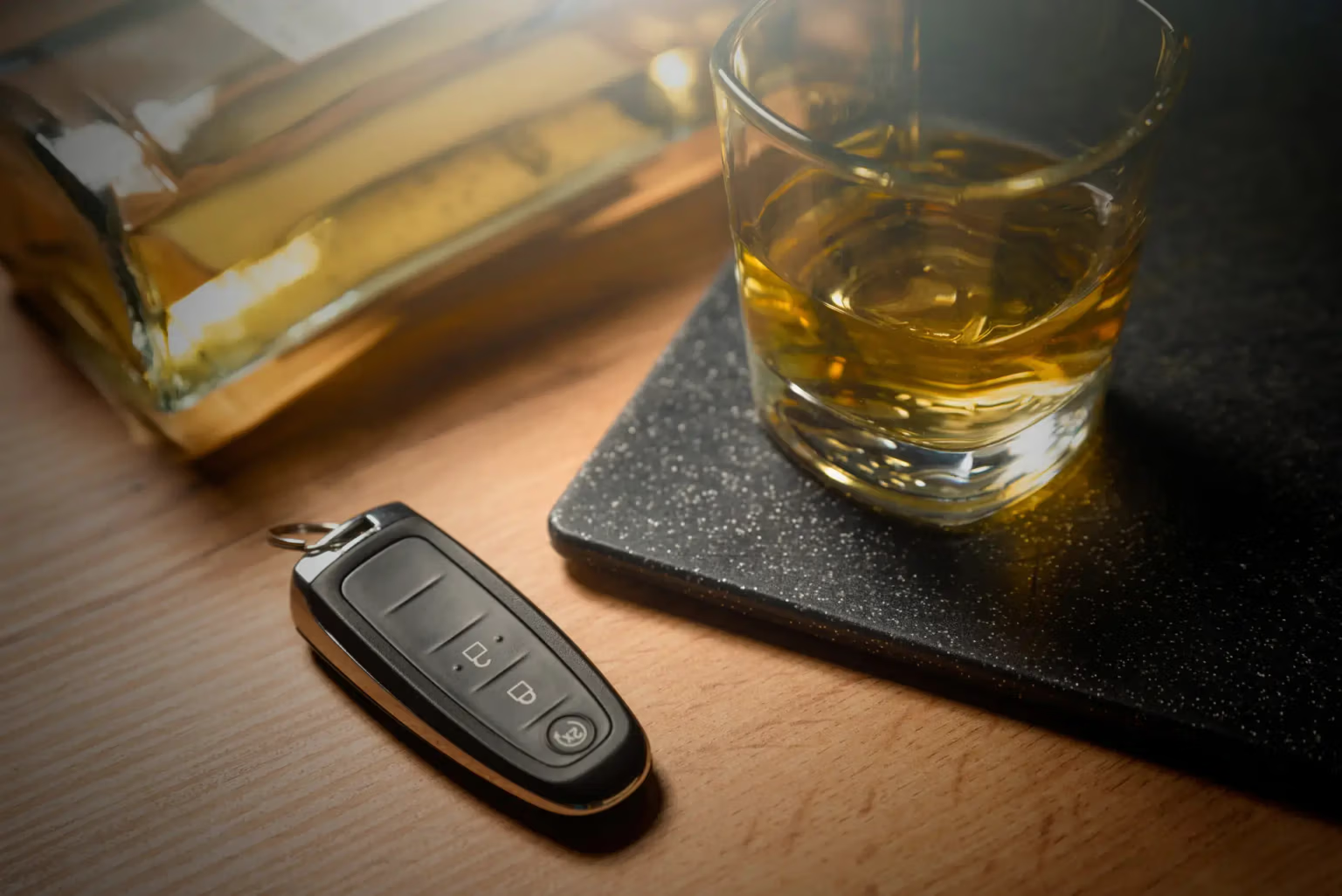Driving under the influence (DUI) occurs when a person operates a motor vehicle while intoxicated by alcohol, drugs, or medication. An impaired driver is less safe on the road and may lead to deadly accidents. States take drunk and drugged driving enforcement seriously and punish defendants severely in many cases. Your DUI charge may be a felony, depending on the circumstances. Not every DUI offense is the same. The number of prior offenses or surrounding circumstances significantly impact whether your charge is a misdemeanor or a felony.
This article will explain the differences between felony and misdemeanor DUI charges. We help you understand the legal distinctions between these two levels, the possible penalties you face, and variations across state law.
What Is Driving Under the Influence?
Every state defines driving under the influence slightly differently, depending on their unique laws. Generally, driving under the influence occurs when an individual operates a motor vehicle while impaired by drugs, alcohol, or other substances. Impairment typically requires some showing that the driver was less safe or unsafe while driving. Other laws set a “per se” limit, meaning a defined and measurable quantity of a substance that automatically constitutes intoxication.
Drunk driving occurs when a person is under the influence of alcohol. Any amount of alcohol might, hypothetically, cause intoxication and lead to drunk driving accidents. If a person’s blood alcohol concentration (BAC) is 0.08% or higher, the driver is per se intoxicated and may be charged with DUI. Many states have lower per se limits for underage drivers or those on some form of DUI probation. States also frequently create a lower threshold for commercial drivers who hold a CDL and are in the course of their employment.
Drugged driving is another form of DUI. A person under the intoxicating effects of legal or illegal drugs may be charged. This may even include over-the-counter medication in many circumstances.
Felony vs. Misdemeanor DUI Charges
There are several important questions here: Is driving under the influence a felony? Is drunk driving a felony? Is drunk driving a felony or misdemeanor? The short answer is: It depends. Most DUI charges are misdemeanors, but some may elevate to a felony under the right conditions. A misdemeanor DUI is a lower-level charge, but one that still carries serious consequences. It typically imposes a maximum period of incarceration of one year or less. The fines are also less severe than with a felony DUI offense. Many misdemeanor charges will result in probation or a driver’s license suspension rather than incarceration. When incarceration is imposed, it usually occurs in a local jail rather than a prison.
Felony DUIs are quite different. Several factors may elevate a DUI to a felony, and these vary widely by state. A felony-level DUI may impose a prison sentence of one year up to many. Fines typically exceed $1,000 and can even be several thousand dollars. Some may even be tens of thousands of dollars.
Factors That Elevate a DUI to a Felony
Most DUIs are misdemeanors, but certain circumstances may elevate them to a felony. Factors that could raise the level of your charge include:
Prior DUI Convictions
One of the primary reasons that elevate a misdemeanor to a felony is if a person has prior DUI convictions. Every state is different, but the more DUIs on your record, the more likely it is to be a felony. However, some states never raise a DUI to a felony but simply increase the penalties.
Bodily Harm Caused During the Offense
If a drunk driver causes bodily harm, it is very likely to be raised to a felony. If the injuries are very serious or a person is killed, it is nearly always a felony. Some states raise the level of the DUI, charge the driver with other offenses, or both. A drunk driver may face several misdemeanors and felonies depending on the crimes they committed.
At-fault accident cases require proof of who drove while intoxicated and the harm that they caused. An experienced DUI attorney best presents this evidence.
High Blood Alcohol Concentration (BAC)
The more a driver drinks, the higher their BAC goes. Most states set different threshold levels for BAC and the related charge. In some cases, if the BAC is high enough, even a first-time DUI may be a felony. In other cases, a certain BAC level coupled with another factor might raise the offense to a felony.
Child Endangerment
Many states instantly elevate a DUI to a felony if there are minor children in the car. Some include anyone 17 and under in that charge, while others set lower ages. In any case, children in the vehicle is one factor that could very likely enhance the charges a driver faces.
Property Damage
Serious property damage or leaving the scene of a crime in which property is damaged may also raise a DUI to a felony. In many states, minor property damage might still constitute a misdemeanor. However, the more serious the damage, the more likely the charge will be enhanced.
Consequences of a Felony DUI Charge
Drunk driving felony charges carry very serious penalties. This can include thousands of dollars in fines or even tens of thousands in certain states. It could result in a prison sentence of one year or up to several decades. The specific penalties a driver faces depend on the DUI charge itself, accompanying criminal charges, and the situation’s unique circumstances.
Felonies may also carry other impacts on your rights, such as:
- The loss of the right to vote or serve on a jury
- A permanent criminal record
- Loss of the right to carry a firearm
- Inability to gain certain licensures or privileges
- The loss of your driver’s license
A DUI felony may also impact your reputation. There is a significant social stigma attached to felony convictions. Many employers or people hear that a person is a “felon” and instantly come to opinions about them.
Variations in DUI Laws Across States
Every state’s DUI laws are different. Some are very similar, while others are incredibly unique. Here, we explore Louisiana and Texas DUI laws.
Louisiana DUI Laws
Louisiana Revised Statutes 14:98 covers “operating under the influence” charges, also called an OWI. Drivers with a BAC of 0.08% or higher are automatically considered intoxicated under Louisiana law. A DUI is a misdemeanor for a first or second offense. Third, fourth, and subsequent offenses within 10 years are all felonies.
Louisiana also has unique factors that may increase the sentence for a first-time DUI, such as:
- If a person’s BAC is over 0.15%, additional penalties are imposed
- If a person’s BAC is over 0.20%, mandatory jail and a higher fine are imposed
- If a child 12 years old or younger was in the vehicle, the jail sentence may not be suspended
This is a brief overview of DWI in Louisiana. An experienced attorney can explain more fully.
Texas DUI Laws
Under Texas law, you are considered intoxicated as soon as alcohol or drugs affect your driving, even if it is under the “per se” limit. The general “per se” limit is 0.08%, at which point the driver is automatically considered intoxicated. Most first or second-time driving while intoxicated (DWI) charges are misdemeanors unless unique circumstances apply.
A Texas DWI may be a felony if:
- It is a third or subsequent offense
- The driver committed DWI assault
- Children were in the vehicle
- The accident caused a crash that resulted in serious bodily injury to another person
Felony DWIs in Texas can carry prison sentences between 2 to 10 years, with fines of up to $10,000.
The Process for Reducing Felony DUI Charges
You can sometimes reduce a felony to a misdemeanor through the legal process. The primary way is through a plea bargain. A plea bargain is an agreement between the defendant and the prosecutor to plead guilty to a reduced charge. For example, if a person is charged with a felony DUI because of their high BAC, they could plea down to a misdemeanor instead. This avoids the need for a trial and reduces the potential penalties a person faces.
Legal representation is critical when facing felony DUI charges. An experienced DUI defense attorney can select the right defensive strategy that may reduce or dismiss the charges against you.
Long-Term Implications of DUI Convictions
A DUI charge will show up on background checks, especially if it is a felony. This can have an effect on your employment and in getting special licenses. You may be unable to get a commercial driver’s license or professional licensure through state boards. It can also impact on whether an employer will hire you, even if driving has nothing to do with your new job.
In many states, you may expunge or seal your DUI conviction. Some states may remove an offense within five years, while others will never remove a DUI from a driver’s record. Louisana permits expungement after 10 years, while Texas never permits the expungement or sealing of a DUI offense. Some states may make unique exceptions, and laws may change. Drivers should ask their DUI attorney about their options and legal rights.
Drunk Driving FAQs
Is drinking and driving a felony in the US?
A DUI is usually a misdemeanor. But many states elevate the charge to a felony in serious cases. A high blood alcohol concentration (BAC), child endangerment, or serious bodily harm in an accident may raise the offense to a felony.
What is the punishment for drunk driving in the US?
Drunk driving penalties vary widely by state and the unique factors of the case. First-time offenses often result in low fines, probation, driving classes, and a license suspension. More serious cases or felonies may result in jail time, prison, higher fines, and loss of constitutional rights.
Is drunk driving a criminal offense in the US?
Yes, drunk driving is a criminal offense in every state in the nation. Each state has its own unique laws and may even call the offense something different.
Understanding the Severity of DUI Charges
Whether you face misdemeanor or felony DUI charges, the implications are serious. You face the potential for high fines, jail or prison time, driver’s license suspensions, and much more. You may have to drive with an ignition interlock device attached to your car and have a long-lasting scar on your criminal record.
It is crucial to have legal representation in these types of cases. At Morris & Dewett Injury Lawyers, we can help. Our team helps accident victims in civil cases with drunk drivers get the compensation they deserve. Contact us today for a free consultation of your case.





